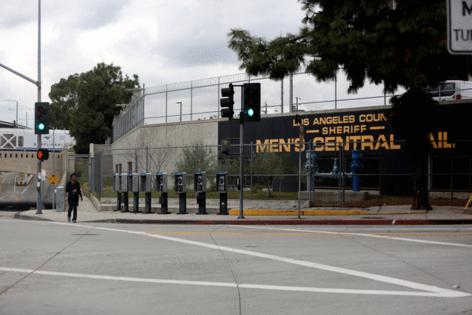Commentary: The push to hold more nonviolent suspects in jail threatens public safety
Published in Op Eds
Jails in America are dangerous. So far this year, 38 people have died inside Los Angeles County jails in as many weeks. This is more than five times the number of executions in the entire state of California since 2000. Many carceral facilities across the nation are incapable of keeping people safe while in state custody.
The Trump administration recently signed an executive order to punish jurisdictions that do not incarcerate people accused of misdemeanors and lower-level crimes while they await trial. In this most recent draconian attempt to “make our cities safe again,” Trump plans to withhold federal funding from local and state governments that allow nonviolent offenders to go home and to work while they await trial.
This order does not improve public safety; it endangers more people. Public safety includes more than the free. It includes those of us who are incarcerated. Our government has a responsibility to ensure the safety, rights and dignity of people detained, whether awaiting trial or after a conviction. We abandon this obligation by holding people captive in facilities plagued by what the ACLU has called “ medieval” living conditions, with incompetent medical care, illness, violence, a predatory commercial bail industry and far too many early deaths.
Denying local and state governments the freedom to decide who is and who is not a threat to public safety also undermines democratic self-governance and further erodes public trust at a moment when faith in state institutions is at its lowest in decades.
Our justice system has a responsibility to care for people who are incarcerated, regardless of their innocence. The Supreme Court ruled on this in 1976. In Estelle vs. Gamble, courts established a prisoner’s right to adequate medical care and said that deliberate indifference to serious medical needs violates the 8th Amendment prohibition on cruel and unusual punishment.
The COVID-19 pandemic was a recent reminder why public safety in a democracy includes people in jail. Overcrowding and poor living conditions of carceral spaces helped spread an airborne virus. Many who caught COVID while awaiting trial were at risk of spreading the contagion — and so were jail staff and law enforcement who worked inside, along with visiting families and workers who served these facilities.
When cities reduced jail admissions, dropped charges or began to release nonviolent offenders in response to the pandemic, these decarceration efforts did not increase crime. Instead, they helped bolster public safety by minimizing the spread of the virus. According to a study published in the journal Nature, the relative health and safety of white Americans saw the greatest gains of all groups following pandemic decarceration efforts.
Were Trump’s recent executive order to become a federal mandate, it would halt viable reforms to the cash bail system in Los Angeles, Chicago, Houston and New Jersey. Bail reform has saved millions in taxpayer dollars and helped limit jail overcrowding — a problem that contributes to rising rates of illness, violence and death inside. And according to a report by the Brennan Center for Justice, there is no correlation between ending cash bail and an increase in crime.
When people who pose no threat to public safety lose the freedom to work, take care of family and support their communities, our justice system not only does immediate harm but also seeds resentment and distrust.
People accused of nonviolent and minor crimes who could be released until trial are instead forced to endure life-denying conditions inside. Jails in America suffer from contaminated water, pest infestations, spoiled food, dangerous heat, a drug crisis, inferior medical care and violence. In Los Angeles, a stunning report by independent journalist Cerise Castle revealed that sheriff’s deputy gangs have terrorized and threatened the lives of people within and beyond jail for decades. On Sept. 8, California Attorney General Rob Bonta filed a lawsuit against Los Angeles County for violating the constitutional rights of incarcerated people.
I have studied and measured the dangers of unsafe jails and the threats they pose to public safety. My lab at UCLA analyzed a sample of 180 deaths in 10 city and county detention centers in Maryland between 2008 and 2019. We discovered that 80% of these deaths happened while the individual was awaiting trial and had not been convicted of any crime. Half of the decedents in our sample died within 10 days of admission, and more people died in the first 24 hours than during any other time while in jail. Even short stays in detention present a significant risk of premature death.
Real public safety involves addressing the root causes of crime: low wages, lack of affordable housing and unmet health needs. It also involves protecting the dignity and rights of people on the wrong side of the law while maintaining the public trust. It is a demanding balance, but being faithful to the principles of democracy despite adversity is a defining feature of change in America.
A world where local governments are forced to keep people in jail, even for nonviolent offenses, is primed to punish being poor, unhoused, underemployed or mentally ill. It is also a world that undermines self-governance and local democratic reform.
The people of this nation deserve better.
____
Terence Keel is a professor of human biology, society and African American studies at UCLA. His latest book is “ The Coroner’s Silence: Death Records and the Hidden Victims of Police Violence.” Facebook: Terence D Keel; Instagram: @ terencedouglaskeel
©2025 Los Angeles Times. Visit at latimes.com. Distributed by Tribune Content Agency, LLC.
























































Comments